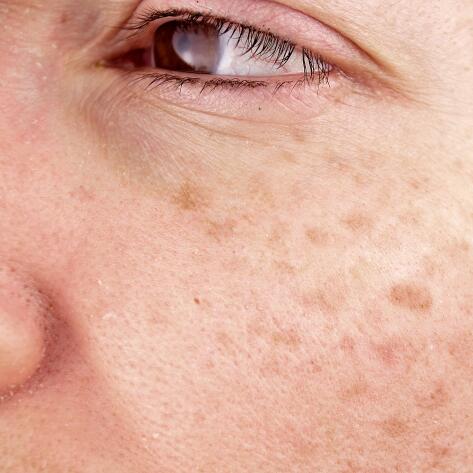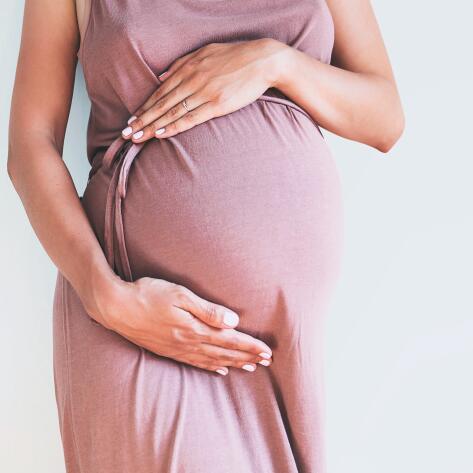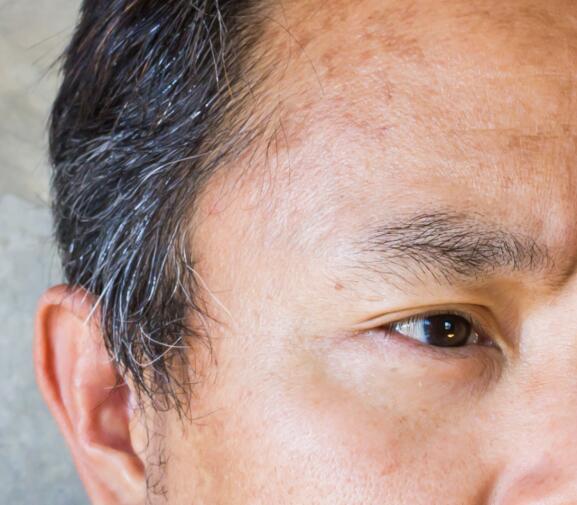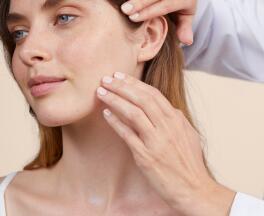Pregnancy mask
What is pregnancy mask?
Also known as melasma, pregnancy mask almost exclusively affects pregnant women.
Symptoms of pregnancy mask
Pregnancy mask is a skin condition that shows up as irregularly shaped pigment spots on the face (forehead, nose, cheekbones or top of the lip), on the neck or on the décolleté. Pregnancy mask appears in some pregnant women after their first trimester of pregnancy and can last after delivery until the baby is six months old.

Causes of melasma
Pregnancy mask occurs due to an overproduction of melanin, the pigment responsible for the colour of the epidermis, by the melanocytes, the cells specialising in tanning, which are in a state of hyperfunction. The hormonal upheaval caused by pregnancy and increase in hormone levels, particularly oestrogen, is responsible for this excessive production of melanin. The type and location of exposure to the sun's rays also plays a role in its occurrence. Be aware that even a very low level of sunlight is enough to cause pregnancy mask to appear. Genetic factors may also play a role in the appearance of pregnancy mask (phototype, family history, etc.).

Who is affected by pregnancy mask?
Contrary to its name, not only pregnant women suffer from pregnancy mask.
Pregnant women are most affected by pregnancy mask.
In France, 5% of pregnant women are thought to be affected by pregnancy mask, but its prevalence varies greatly from one country to another. Dark-skinned women are generally more affected by pregnancy mask than light-skinned women. It’s the phototype of each person, i.e. their skin and hair colour, that determines the risk of developing this skin condition. The darkest phototypes 4 and 5 are the most affected.
If you have already suffered from pregnancy mask during a pregnancy, you should remain vigilant and remember to protect yourself with an appropriate sun cream. This is because women affected by pregnancy mask are at risk of getting them again in future pregnancies.
Men can also be affected by the condition, however.
Some men may also experience sunspots on their face that look like pregnancy mask. This is called melasma or chloasma. Again, this may be due to the use of oestrogenic treatment, for example in the case of prostate cancer, or due to too much and too frequent exposure to the sun.

FRIENDLY, EXPERT ADVICE
How to prevent pregnancy mask
As with sunburn, the “zero risk = zero exposure” formula prevails. To prevent pregnancy mask, it is essential to protect yourself from the sun by avoiding sun exposure, wearing a hat and using a suitable high protection sun cream.
Treatments for pregnancy mask
Melasma usually disappears after childbirth. If this isn’t the case, you can consult a dermatologist who will prescribe you depigmenting creams based on hydroquinone. A depigmenting peel, i.e. a mask made up of active ingredients that help combat skin pigmentation disorders, may also be carried out.

OUR SOLUTIONS TO PROTECT OUR FUTURE
Eau Thermale Avène skin care products designed to protect the skin and respect the oceans
NEWSLETTER
We're always here for your skin!
All our advice on how to take care of your skin day to day.

Which skin care routine should you adopt?
Identify what it really needs with the help of our experts and discover the most suitable skin care routine for you.
